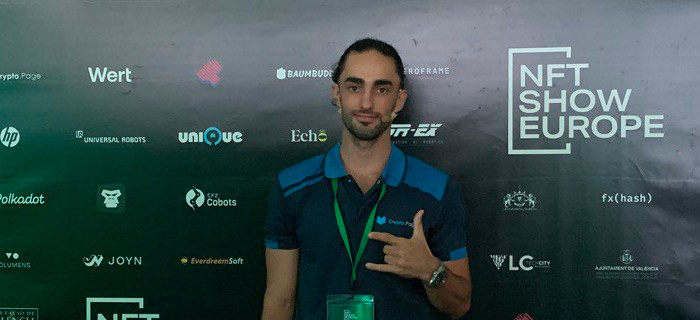Could you tell us more about yourself, your career and how you ended up in the crypto world?
My career is completely within crypto as I have started to work in this sector in 2013. At the beginning, I was involved in crypto mining. Then, I became the co-founder of a UK company called Cryptopay, which is one of the oldest running bitcoin wallet, prepaid card issuer and merchant processor. This is still up and running.
Two and a half years ago, I decided to sell my shares in my previous ventures and do something new, which is Wert. Wert is a B2B company which helps web3 and non-custodial wallets to on-board and sell cryptocurrencies or other assets seamlessly.
You are CEO at Wert, could you tell us more about the organisation?
The idea behind Wert is that web3 is changing the whole architecture of web services and how commerce happens online. Decentralised or non-custodial architecture is happening in the crypto world and it might extend to classic ecommerce or other services. Therefore, the idea is that there is a wallet, which is a user, and then there is a Dapp, which is a service. If the user initiates something with the Dapp only cryptocurrency is used. Therefore, there is no link between real world fiat money and everything that happens inside the app or inside the crypto world.
The idea was to help people to get into the crypto world through the purchase of cryptocurrency because on the long run crypto will not be a product itself rather than a transactional or intermediary mechanism. For example, you need to buy crypto in order to buy an NFT. Our product however enables consumers to purchase NFTs just with their credit or debit card or any payment method that we support, directly from the smart contract through an on-chain transaction. Therefore, users do not need to have crypto in their wallets but they still can buy those digital goods as if they had it.
Why is it important to develop a payment module for the crypto environment?
Imagine you are a non-custodial and decentralised NFT marketplace. If your consumers want to buy NFTs today, they need to go to an exchange, proceed to KYC, buy crypto, withdraw crypto from the exchange to their wallet, and then buy the NFT. The whole process can take days and can be a nightmare from the users’ experience perspective. Therefore, we help those NFT marketplaces to enable credit card purchasing, just like normal virtual goods in classic ecommerce style.
At Wert, you apply different KYC procedures depending on the needs of your clients, how does it work?
We have two different KYC procedures, a documentary and a non-documentary one. With KYC, depending on the transaction volume, we either ask the consumer to upload documents or not. It is simple. For the future, we are planning to introduce a third level, which will allow for enhanced diligence for larger transactions starting from 50K. We are also considering doing electronic KYC.
Do you think existing KYC solutions could be improved in the near future? How?
In my opinion, the best way to do KYC is not to do it at all because it is a pain point for the crypto industry. However, at Wert we do KYC during the purchase process. Most of the data, which is required for KYC, like first name, last name, billing address, is also used for the card transaction because you have a name on cards and a billing address. We just use that data to perform a KYC in the background. The only thing that we would ask additionally is the date of birth.
What is in your opinion the most relevant challenge that crypto companies need to face today and how would it be possible to help them?
There are many challenges that crypto companies may face. I am not going to talk about crypto companies that are regulated and licensed like exchanges or wallet providers. Their challenges are not really challenges, but tasks that need to be done. However, for non-custodial wallets in web3, avoiding the regulation is the main challenge. If a web3 company is regulated, it loses the competitive advantage and the whole blockchain mechanism stops making sense. Why would you need blockchain if you use your non-custodial wallet like a custodian one? In the end, It loses its appeal.
If you could give regulators one piece of advice about the upcoming regulations of the crypto market, what would it be?
Crypto regulation has already proved successful, mostly with the fifth anti-money laundering Directive. Furthermore, the new MiCa regulation will allow for harmonisation all across Europe. I actually think that regulators are doing a good job. However, there is a concept of balance in the regulation of the service or goods. For example, Bitcoin is not regulated, it shouldn’t be regulated. However, companies that provide services related to cryptocurrencies like buying or selling should be regulated.
Another important aspect is the regulation of custodial and non-custodial wallets. For custodians, the regulation is already quite well developed. However, for non-custodial companies regulation would be useless. In the end, cryptocurrency wallets are just software. You cannot regulate software. It just does not make sense and it harms the industry in the long term.
For example, there was a regulation for non-custodial wallets that forbade storing more than €1000. In this case, the exchange should be limiting withdrawals and treating them as high risk. It is simply not fair.
A good analogy is cash. I think cryptocurrency regulation should somehow follow cash regulation. Imagine you have cash in your physical wallet. You can spend it, you can use it, and nobody can tell you anything because it is a legal tender. However, whenever you bring it to a bank, it can ask you where the cash is coming from, if it is a certain amount. The same should be applied to cryptocurrencies.
What is in your opinion the future of crypto and why should people be interested in this world?
Young people are always the audience of all the new developments that are coming. The most important concept is the one of owning your money. For young people, it should be very important to understand the relationship between one’s efforts and money. Our money is what we get for our efforts and we ourselves should be the only person responsible for it. Nobody else should be responsible for keeping your money or giving you access to your money, or limiting you in any way to spend your wealth, your funds or your savings.
This is essential because in the crypto world nobody can limit you with regard to your money, while in a bank it is possible. Crypto is in the end a means to increase the freedom to use, control, and to know how to store your money.
We would like to thank George again for sharing his insights. If you have any questions, suggestions or if you want to be our next interviewee, do not hesitate to contact us via info@zkportal.io


